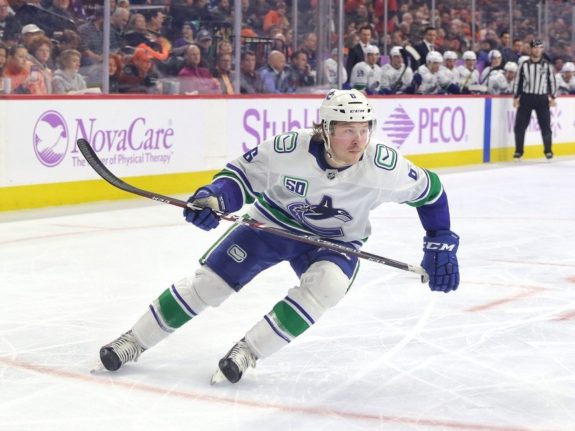After extending both Elias Pettersson and Quinn Hughes, Vancouver Canucks’ general manager Jim Benning will now turn his attention to his 2015 first-round pick, Brock Boeser. The forward is coming off an impressive season, where he led the team in goals with 23 and points with 49 in 56 games.
He signed his second NHL contract before the 2019-20 season for three years and it is scheduled to expire after this 2021-22 campaign.
Boeser’s Contract Situation
Boeser is in the final season of his three-year contract with an annual average value (AAV) of $5.875 million. He received the contract after posting 29 goals and 55 points in his rookie season and 26 goals and 56 points in his sophomore season. He will be a restricted free agent (RFA) this offseason. Since he signed his contract before the new CBA, his qualifying offer is based on his total salary, which is $7.5 million.
Canucks’ Cap Situation
Along with Boeser, the Canucks have Tyler Motte, Brandon Sutter, Justin Bailey, Brad Hunt and Jaroslav Halak who are set to become unrestricted free agents (UFA). Additionally, Matthew Highmore, Jack Rathbone and Olli Juolevi highlight the remaining group of RFAs. Motte, Rathbone and Juolevi are the players the Canucks will likely look to re-sign as long as they have a good 2021-22 season. The 2021-22 season is the last year the club will carry Roberto Luongo’s $3.035 million recapture penalty.
Related: Vancouver Canucks 2021-22 Season Preview Section
Meanwhile, the Canucks will have $2.4 million in dead cap after buying out Braden Holtby and Jake Virtanen this past offseason. The Canucks will have $13.298 million in cap space next season, which should give the team enough room to extend Boeser, as long as Benning doesn’t spend some of that money elsewhere.
Contract Comparables
Boeser had his best season in 2020-21 since his rookie year. He was on pace to score 34 goals and post 72 points in an 82 game season.
It is hard to find contract comparables for Boeser. Other players with similar production last season include Kyle Connor, Evander Kane, Brayden Point and Mika Zibanejad. Connor received a seven-year contract with an AAV of $7.142 million. Kane earned a seven-year contract with an AAV of $7 million. Both Connor and Kane’s AAVs are tough to compare with Boeser since the starting point for his next contract will be at $7.5 million.
Point is coming into the last season of his three-year deal with an AAV of $6.750 million and is entering an eight-year contract with an AAV of $9.5 million starting in 2022-23, which isn’t a cap-hit Boeser will receive. Zibanejad is in a similar situation as Boeser since he is coming off a five-year contract with an AAV of $5.350 million. If Zibanejad signs his next contract before Boeser, it will give both sides (the team and the player) an idea of how much the forward should receive.
Unless Boeser scores 40+ goals next season, the Point comparison doesn’t work. The forward will have to have a career year to receive a contract with a cap-hit above $9 million. Meanwhile, the Connor and Kane deals are good comparisons for the term of Boeser’s next contract, while the Zibenajad deal could set the tone for the negotiations between the forward and the team.
Projected Contract for Boeser
The Canucks will likely have to offer Boeser a six to a seven-year contract with an AAV between $7.5-$8.5 million. If he signs a contract with a cap hit higher than $7.850 million, which is the AAV of Hughes’ six-year contract, he will carry the highest cap hit on the roster.

After Boeser’s contract is signed, the next big free agents the Canucks will have to negotiate with are Bo Horvat, J.T. Miller and Nils Hoglander. Horvat and Miller will be UFAs, while Hoglander will be an RFA. It’ll be interesting to see how general manager Jim Benning navigates around the salary cap the next few seasons to re-sign his core players.